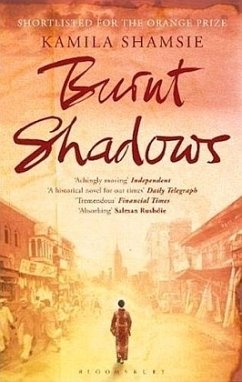SHORTLISTED FOR THE ORANGE PRIZE 2009
In a prison cell in the US, a man stands trembling, naked, fearfully waiting to be shipped to Guantánamo Bay. How did it come to this? he wonders...
August 9th, 1945, Nagasaki. Hiroko Tanaka steps out onto her veranda, taking in the view of the terraced slopes leading up to the sky. Wrapped in a kimono with three black cranes swooping across the back, she is twenty-one, in love with the man she is to marry, Konrad Weiss.
In a split second, the world turns white. In the next, it explodes with the sound of fire and the horror of realisation. In the numbing aftermath of a bomb that obliterates everything she has known, all that remains are the bird-shaped burns on her back, an indelible reminder of the world she has lost.
In search of new beginnings, she travels to Delhi two years later. There she walks into the lives of Konrad's half-sister, Elizabeth, her husband James Burton, and their employee Sajjad Ashraf, from whom she starts to learn Urdu. As the years unravel, new homes replace those left behind and old wars are seamlessly usurped by new conflicts. But the shadows of history - personal, political - are cast over the entwined worlds of the Burtons, Ashrafs and the Tanakas as they are transported from Pakistan to New York, and in the novel's astonishing climax, to Afghanistan in the immediate wake of 9/11. The ties that have bound them together over decades and generations are tested to the extreme, with unforeseeable consequences.
Sweeping in its scope and mesmerising in its evocation of time and place, Burnt Shadows is an epic narrative of disasters evaded and confronted, loyalties offered and repaid, and loves rewarded and betrayed.
In a prison cell in the US, a man stands trembling, naked, fearfully waiting to be shipped to Guantánamo Bay. How did it come to this? he wonders...
August 9th, 1945, Nagasaki. Hiroko Tanaka steps out onto her veranda, taking in the view of the terraced slopes leading up to the sky. Wrapped in a kimono with three black cranes swooping across the back, she is twenty-one, in love with the man she is to marry, Konrad Weiss.
In a split second, the world turns white. In the next, it explodes with the sound of fire and the horror of realisation. In the numbing aftermath of a bomb that obliterates everything she has known, all that remains are the bird-shaped burns on her back, an indelible reminder of the world she has lost.
In search of new beginnings, she travels to Delhi two years later. There she walks into the lives of Konrad's half-sister, Elizabeth, her husband James Burton, and their employee Sajjad Ashraf, from whom she starts to learn Urdu. As the years unravel, new homes replace those left behind and old wars are seamlessly usurped by new conflicts. But the shadows of history - personal, political - are cast over the entwined worlds of the Burtons, Ashrafs and the Tanakas as they are transported from Pakistan to New York, and in the novel's astonishing climax, to Afghanistan in the immediate wake of 9/11. The ties that have bound them together over decades and generations are tested to the extreme, with unforeseeable consequences.
Sweeping in its scope and mesmerising in its evocation of time and place, Burnt Shadows is an epic narrative of disasters evaded and confronted, loyalties offered and repaid, and loves rewarded and betrayed.

Kamila Shamsies Großepos
Kamila Shamsie ist keine Unbekannte in Deutschland. Drei ihrer Romane liegen übersetzt vor. Ihr war es jahrelang zu verdanken, dass Literatur aus Pakistan bei uns wahrgenommen wurde. Inzwischen ist Mohammed Hanif als zweite Stimme hinzugekommen. Soll man aber Shamsies neuen, ehrgeizigen Roman überhaupt als pakistanische Literatur einordnen? Die Autorin wohnt in London, die Handlung ihres Romans spielt nur zum geringsten Teil in Pakistan. Er streift ein halbes Jahrhundert Zeitgeschichte, beginnt in Japan, bewegt sich über Indien, Pakistan und Amerika nach Afghanistan und endet in Kanada. Die Autorin hat sich vier weltverändernde Ereignisse ausgesucht, um die sie ihre Figuren gruppiert: die Atombombe von Nagasaki 1945, die Teilung des indischen Subkontinents zwischen Indien und Pakistan 1947, die sowjetische Okkupation von Afghanistan und die Zerstörung des World Trade Center 2001.
Die Japanerin Hiroko Tanaka überlebt die Atombombe, nicht jedoch ihr deutscher Bräutigam. Sie reist nach Delhi, um dessen Schwester zu treffen, die mit einem Engländer verheiratet ist. Hiroko verliebt sich in dessen indischen Freund, Sajjad, einen Muslim, heiratet ihn und geht mit ihm nach Karachi. Ihr Sohn Raza emigriert eine Generation später nach Amerika, kann aber seine Wurzeln nicht vergessen und arbeitet für die CIA in Afghanistan. Dort verfängt er sich in kriminellen Machenschaften und wird schließlich in Toronto verhaftet. Shamsie bemüht sich ohne rechten Erfolg, der Verflechtung von Menschen verschiedener Nationen, Kulturen, Religionen und Klassen eine präzise Psychologie zu unterlegen, damit das umfangreiche Romanpersonal nicht in einem See ungefährer Identitäten versinkt. Die Schicksale sind von den zeitgeschichtlichen Traumata bestimmt. Individuell geprägte Schicksale können sich kaum entfalten. Fesselnd ist dagegen der ständige Perspektivenwechsel. Eine bequeme Aufteilung in Täter- und Opferblick gibt es hier nicht. Auch die Opfer sind Täter, auch sie vertreten unterschiedliche Ansichten und Strategien.
MARTIN KÄMPCHEN
Alle Rechte vorbehalten. © F.A.Z. GmbH, Frankfurt am Main
'Completely authentic, complex, breath-stopping' Emma Thompson
A formidable arching tale about loss and foreignness

